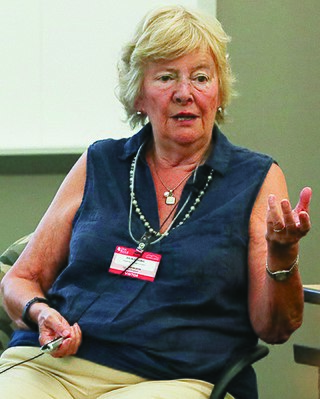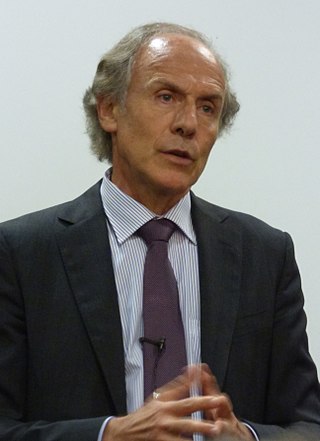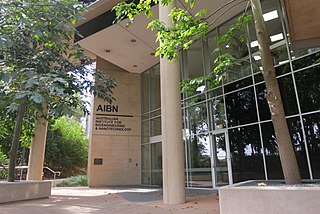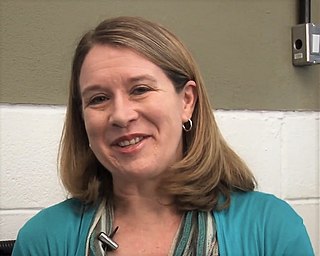Related Research Articles

Molecular engineering is an emerging field of study concerned with the design and testing of molecular properties, behavior and interactions in order to assemble better materials, systems, and processes for specific functions. This approach, in which observable properties of a macroscopic system are influenced by direct alteration of a molecular structure, falls into the broader category of “bottom-up” design.

Dame Julia Stretton Higgins is a British polymer scientist. Since 1976, she has been based at the Department of Chemical Engineering at Imperial College London, where she is emeritus professor and senior research investigator.
Craig Jon Hawker is an Australian-born chemist. His research has focused on the interface between organic and polymer chemistry, with emphasis on the design, synthesis, and application of well-defined macromolecular structures in biotechnology, microelectronics, and surface science. Hawker holds more than 45 U.S. patents, and he has co-authored over 300 papers in the areas of nanotechnology, materials science, and chemistry. He was listed as one of the top 100 most cited chemists worldwide over the decade 1992–2002, and again in 2000–2010.

The Eureka Prizes are awarded annually by the Australian Museum, Sydney, to recognise individuals and organisations who have contributed to science and the understanding of science in Australia. They were founded in 1990 following a suggestion by science journalist Robyn Williams.

Alan Simon Finkel is an Australian neuroscientist, inventor, researcher, entrepreneur, educator, policy advisor, and philanthropist. He was Australia’s Chief Scientist from 2016 to 2020. Prior to his appointment, his career included Chancellor of Monash University, President of the Australian Academy of Technology and Engineering (ATSE), and CEO and founder of Axon Instruments, and CTO for the electric car start-up Better Place Australia.
Amanda Susan Barnard is an Australian theoretical physicist working in predicting the real world behavior of nanoparticles using analytical models and supercomputer simulations and applied machine learning. Barnard is a pioneer in the thermodynamic cartography of nanomaterials, creating nanoscale phase diagrams relevant to different environmental conditions, and relating these to structure/property maps. Her current research involves developing and applying statistical methods and machine/deep learning in nanoscience and nanotechnology, and materials and molecular informatics. In 2014 she became the first person in the southern hemisphere, and the first woman, to win the Feynman Prize in Nanotechnology, which she won for her work on diamond nanoparticles.

The Institute of Spectroscopy Russian Academy of Sciences (ISAN) is a Russian research institution located in Troitsk, Moscow
Mary Ann Augustin is an Australian food chemist and dairy scientist who leads the Food Science Research Program at CSIRO. Much of her work has focused on understanding the changes that occur during dairy milk processing and the effect these changes exhibit on the proteins and minerals of milk, which are collectively referred to as "milk functionality".
Traian V. Chirilă is a Romanian-Australian polymer and organic chemist who is the inventor of AlphaCor, an artificial cornea in current clinical use throughout the world.

The University of Queensland's Australian Institute for Bioengineering and Nanotechnology (AIBN) was established in 2003. It is one of four stand-alone research institutions at the university with more than 500 researchers, students and support staff. The inaugural Director was Peter Gray. The institute's second director, Professor Alan Rowan, commenced in 2016.
Peter Philip Gray is a bioengineer who has played a key role in the development of modern industrial biotechnology in Australia. He was professor and head of biotechnology at the University of New South Wales (UNSW), Sydney, from 1988–2003, and was the inaugural director of the Australian Institute for Bioengineering and Nanotechnology (AIBN) at The University of Queensland in Brisbane, Australia from 2003–2015.
Catherine Patricia Foley is an Australian physicist. She is the Chief Scientist of Australia since January 2021, before which she had been the chief scientist for the Commonwealth Scientific and Industrial Research Organisation (CSIRO) since August 2018.

Omowunmi "Wunmi" A. Sadik is a Nigerian professor, chemist, and inventor working at New Jersey Institute of Technology. She has developed microelectrode biosensors for detection of drugs and explosives and is working on the development of technologies for recycling metal ions from waste, for use in environmental and industrial applications. In 2012, Sadik co-founded the non-profit Sustainable Nanotechnology Organization.
Murali Sastry is an Indian material chemist, nanomaterial scientist and the chief executive officer of the IITB-Monash Research Academy. He is a former chief scientist at Tata Chemicals and a former senior scientist at the National Chemical Laboratory. He is known for his studies on surfaces, films and materials chemistry and is an elected fellow of Maharashtra Academy of Sciences and the Indian Academy of Sciences. The Council of Scientific and Industrial Research, the apex agency of the Government of India for scientific research, awarded him the Shanti Swarup Bhatnagar Prize for Science and Technology, one of the highest Indian science awards, in 2002, for his contributions to chemical sciences.

Nicole Grobert FRSC FYAE is a German-British materials chemist. She is a professor of nanomaterials at the Department of Materials at the University of Oxford, fellow of Corpus Christi College, Oxford, and a Royal Society industry fellow at Williams Advanced Engineering. Grobert is the chair of the European Commission's Group of Chief Scientific Advisors.

Christy Lynn Haynes is a chemist at the University of Minnesota. She works at the interface of analytical, biological, and nanomaterials chemistry.
Lianzhou Wang is a Chinese Australian materials scientist and professor in the School of Chemical Engineering at the University of Queensland. He is director of the Nanomaterials Centre (Nanomac) and a senior group member at the Australian Institute for Bioengineering and Nanotechnology at the University of Queensland, as well as a Fellow of the Royal Society of Chemistry.
Sally L. McArthur is an Australian materials scientist who is a professor of biomedical engineering at Swinburne University of Technology and a research scientist at CSIRO. Her research considers the development of novel biomaterials for biomedical, nutritional and environmental applications.
Aibing Yu is a Chinese–Australian chemical engineer, serving as Pro Vice-Chancellor and Foundation President (Suzhou) at Monash University where he is also Sir John Monash Distinguished Professor Director of ARC Research Hub for Smart Process Design and BHP-Baowu-Monash Knowledge Centre for LCM.
Bronwyn Fox is an Australian scientist who is professor of materials science and the deputy vice chancellor research and enterprise at the University of New South Wales. She formerly served as the chief scientist at CSIRO. Her research considers carbon fibre and composite materials. She was awarded the 2020 Royal Society of Victoria Medal for Excellence in Scientific Research.
References
- 1 2 3 "Dr Anita Hill". people.csiro.au. CSIRO . Retrieved 9 May 2019.
- 1 2 "Dr Anita Hill". aibn.uq.edu.au. University of Queensland . Retrieved 9 May 2019.
- ↑ Bailey, Michael. "CSIRO's chief scientist Cathy Foley wants colleagues to "feel loved"". www.afr.com. Australian Financial Review . Retrieved 9 May 2019.
- ↑ Park, Ho Bum; Jung, Chul Ho; Lee, Young Moo; Hill, Anita J.; Pas, Steven J.; Mudie, Stephen T.; Van Wagner, Elizabeth; Freeman, Bennie; Cookson, David J. (12 October 2007). "Polymers with Cavities Tuned for Fast Selective Transport of Small Molecules and Ions". Science . 318 (5848): 254–258. doi:10.1126/science.1146744. PMID 17932294. S2CID 13345897.
- ↑ "Dr Anita Hill". www.science.org.au. Australian Academy of Science . Retrieved 9 May 2019.